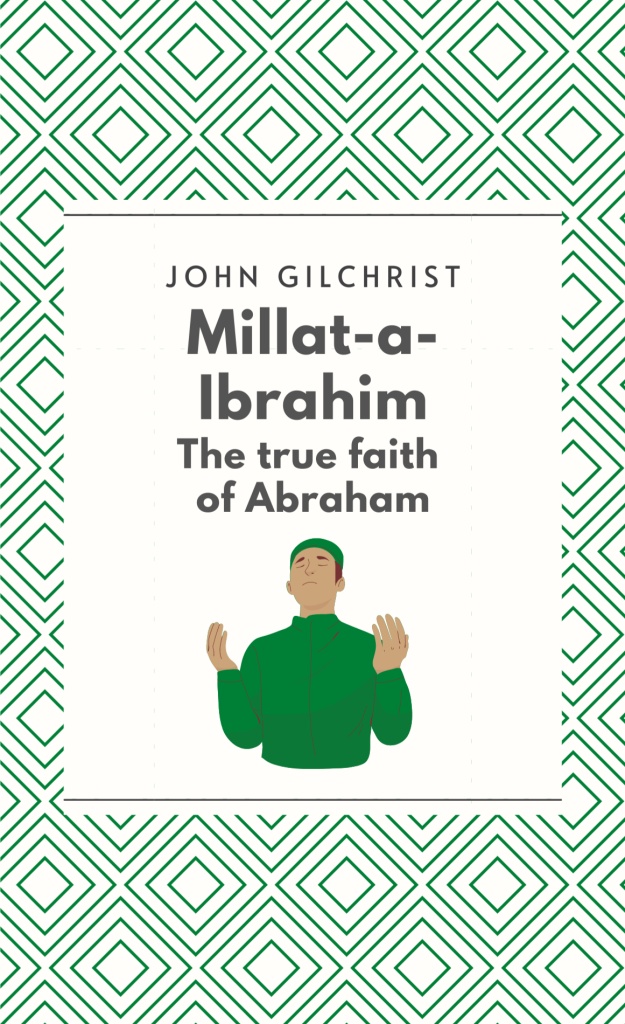The Father of All True Believers
Millat-a-Ibrahim: The True Faith of Abraham


Chapters
« Ch. 2 - Abraham - The Friend of God
The second great point of agreement between the three great monotheistic religions is that Abraham is respected as the head of all the faithful and the father of all true believers. In the Jewish Scriptures it is recorded that God said to Abraham:
"I will make of you a great nation, and I will bless you, and make your name great, so that you will be a blessing". Genesis 12:2
On two other occasions God renewed this promise, adding that he would be the father of a great multitude whom no man could number:
"I will make your descendants as the dust of the earth; so that if one can count the dust of the earth, your descendants also can be counted". Genesis 13:16
"I have made you the father of a multitude of nations". Genesis 17:5
God later confirmed that his covenant would be made, not through his son Ishmael who was born of a slave woman, Hagar, but through Isaac who was born of his wife Sarah (Genesis 17:19). As a result the Jews, who were all descended from Abraham through Isaac, looked on him as the father of their nation and regarded themselves as his true offspring and the nation that had been promised to him. Furthermore, because they also considered themselves the only nation on earth who were the true people of God, they accordingly saw him also as the father of all true believers.
Christians likewise regard Abraham as the father of all true believers, but we do not believe that the promises made to him referred ultimately to his physical offspring, the Jews, but rather to his spiritual offspring, that is, all those who have the same kind of faith that Abraham had. Indeed, in our view, the very choice of Isaac as the son through whom the covenant God had made with Abraham was to be fulfilled, shows that God was not thinking of his physical offspring. If he had, he would have chosen Ishmael, the first son born to Abraham, but he chose Isaac to show that he intended the blessings of the covenant to become effective for those who were spiritual and true in faith towards him. For it is recorded in both the Jewish Scriptures (Genesis 16:12) and the Christian Scriptures (Galatians 4:29) that Ishmael was a decidedly unspiritual man (one born of "the flesh" as opposed to Isaac who was born of "the Spirit") and God therefore overlooked him in favour of Isaac to show that the true beneficiaries of his promises would not be those who would bear Abraham's genetic image in their flesh but rather those who would emulate his faithful character in their spirits. As it is put in the Christian Scriptures:
Not all are children of Abraham because they are his descendants; but "Through Isaac shall your descendants he named". This means that it is not the children of the flesh who are the children of God, but the children of the promise are reckoned as descendants. Romans 9:7-8.
So you see that it is men of faith who are the sons of Abraham ... So then, those who are men of faith are blessed with Abraham who had faith. Galatians 3:7-9.
To us Abraham was accepted by God because he had faith in God and accordingly he became the father of the faithful. As the moon reflects the sun's light, so Abraham in his faith reflected the faithfulness of God. As the sun generates light, so God generates faithfulness and trustworthiness. Abraham responded to this by trusting God and by having faith in him (as we shall see in greater detail shortly). Therefore, just as God is the true Father of all true believers, so Abraham became a reflection of his leadership and was told, "I have made you the father of many nations" (Romans 4:17).
In our view, too, because this promise was made in the plural ("a multitude of nations - Genesis 17:5), it means that Abraham is not only the father of all true believers in Israel but also of all those in every nation who follow the example of his faith. It is therefore said in our Scriptures that the promise was made to all "those who share the faith of Abraham, for he is the father of us all" (Romans 4:16).
Just as the Jews believe, therefore, that Abraham was really a Jew and the father of the Jewish nation, so we believe that he was really a Christian at heart because he had the same kind of faith of which all true Christians are made - not in self-righteous piety through the performance of religious works and good deeds, but in a God-given righteousness by faith in a God who is faithful (1 Corinthians 10:13). We believe he was accepted and appointed as the father of all true believers, not because he had a righteousness which he had in himself, but because he had faith in God's own righteousness and faithfulness. He trusted not in works of law which he performed but in the grace of God towards all who respond to him in true faith. Islam also appoints Abraham as the representative of all true believers on earth. According to the Qur'an he was made an imam, a "faithful leader" for the whole human race. The Qur'an states that Allah said to him:
"Lo, I have appointed you a leader for mankind". Quran 2.124
Islam follows Christianity in regarding him, not as a father of one particular nation, but as the father of all true believers. He is regarded as the head because his belief and creed is regarded as the true one. On the other hand, whereas Christianity marks him out for his faith in God's faithfulness, Islam credits him for his belief in the oneness of God against the polytheism of his day (Quran 21.66-67) and for his submission to the will of God (Quran 2.131). We shall go into this in greater detail as well in the next section, but at this stage it is important to note that as Judaism and Christianity regard him as a true Jew and Christian respectively, so the Qur'an, honouring his submission to God, calls him a muslim (Quran 3.67), saying of him that he was haiifaam-muslimaan - "an upright Muslim" or, more literally, one who was righteous and submissive. Once again his belief in the unity of God (tauhid) is also emphasised as both titles, hanif and muslim, are used for monotheists in the Qur'an in contrast with unbelie-vers (kafirun) and idol-worshippers (mushrikin).
Abraham, as a true Muslim therefore, is regarded in Islam as the imam of all true Muslims and the Qur'an, therefore, again and again exhorts Muslims: faattabi'uu millata Ibrahim - "follow the faith of Abraham", alternatively, follow his creed or form of religion. The true faith that Abraham had, therefore, is called in the Qur'-an the millata-Ibrahim and this very faith is set before all Muslims as the kind of faith they should emulate. We have now considered two of the great points of agreement between Judaism, Christianity and Islam on the prophetic character of Abraham and shall now analyse the third.
Ch. 4 - An Example and Prototype of the True Religion to Come »